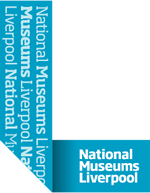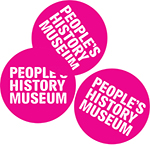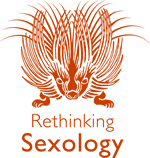This page gives information on the project parters including infromation on how you can visit the museums and archives where you may be able to see the material featured on this website.
 British Museum
British Museum
The British Museum was founded in 1753 and was the first national public museum in the world. From the beginning it granted free admission to all 'studious and curious persons', today the museum is 'the museum of the world, for the world'. It now comprises over 8 million objects spanning the history of the world's cultures: from the stone tools of early man to twentieth century prints.
As part of the schools programme the British Museum runs a free Relationships and Sex Education (RSE) programme that through object enquiry, activities and discussion explores themes within RSE. Working with an artist educator these sessions aim to provide RSE in a cross-curricular, creative and informative way using British Museum objects and contemporary issues to generate discussion. There are four themes for schools to choose from: pornography and consent, body image, LGBT, and gender and transgender identity.
Sessions can be adapted to suit your needs in school. A minimum of 6 weeks' notice is essential when booking. Recommended group size: 20. The RSE programme contributed to the development of the resources based on material from the British Museum which feature on this website.
More infromation on the SRE programme. To book please contact: learning@britishmuseum.org
A special exhibition Desire, love, identity: exploring LGBTQ histories (11 May – 15 October 2017) offers glimpses into LGBTQ (lesbian, gay, bisexual, trans, queer) histories, experiences and lives by examining objects from around the world, covering ancient civilisations right up to today. A trail featuring objects in the permanent galleries that relate to LGBTQ histories will also accompany the show.
 Freud Museum London
Freud Museum London
The Freud Museum, at 20 Maresfield Gardens in Hampstead, was the home of Sigmund Freud and his family when they escaped Austria following the Nazi annexation in 1938. It remained the family home until Anna Freud, the youngest daughter, died in 1982. The centrepiece of the museum is Freud's study, preserved just as it was during his lifetime. It contains Freud's remarkable collection of antiquities: Egyptian; Greek; Roman and Oriental. Almost 2,000 items fill cabinets and are arranged on every surface. There are rows of ancient figures on the desk where Freud wrote until the early hours of the morning. The walls are lined with shelves containing Freud's large library.
The museum is available for facilitated group visits of 12 or more, allowing students to explore the resources of the museum, experience the intense atmosphere of Freud's Study and consulting room, and discuss Freud's life and work at times when the Museum is closed to the general public. Education staff will be pleased to tailor a session specifically to the interests of your group.
More information on education at the Freud Museum London.
 National Museums Liverpool
National Museums Liverpool
National Museums Liverpool is a group of museums and galleries. The collections are among the most important and varied in Europe and contain everything from Impressionist paintings and rare beetles to a lifejacket from the Titanic.
Get the most out of your museums and art galleries with a range of downloadable resources, learning sessions and practical information for planning a visit. Best of all, there is free entry to all of our museums and art galleries, including the exhibitions and events. More on Education and Communities National Museums Liverpool: http://www.liverpoolmuseums.org.uk/learning/index.aspx
Pride and Prejudice is a groundbreaking project to put online the social history collections held at the Museum of Liverpool, and the fine and decorative art collections at Sudley House, Walker and Lady Lever art galleries, that have an LGBT connection. The themes are: Faith and Belief, Gender Identity, Health and Wellbeing and Icons.
 People's History Museum
People's History Museum
The People's History Museum in Manchester is the national museum of democracy. We aim to engage, inspire and inform diverse audiences by showing 'there have always been ideas worth fighting for'.
The museum offers an inspiring Learning Programme for early years, primary schools, secondary schools, further and higher education institutions, and adult and community groups. The museum can adapt all the programmes listed to suit the needs of any group – just ask! Many of our sessions are suitable, or can be adapted, for learners with special needs. Follow @PHMLearn on twitter for the latest from the Learning Team. More on Learning at the People's History Museum.
Never Going Underground: The Fight for LGBT+ Rights (25 February - 3 September 2017) is a an unique exhibition curated by members of the local LGBT+ community. This marks the 50th anniversary of the 1967 Sexual Offences Act, exploring and celebrating those who campaigned and continue to campaign for equality for LGBT+ people. The exhibition details the development of an LGBT+ movement, showing the internal and external struggles, the different party political approaches to equality, and the social and historical context of the last sixty years of activism. This is the complex and compelling story of a long and often bumpy journey.
 Rethinking Sexology
Rethinking Sexology
Rethinking Sexology is a Wellcome funded Joint Investigator Award project led by Professor Kate Fisher and Dr Jana Funke at the University of Exeter. This interdisciplinary project seeks to rethink the history of sexual science, the mainly Western attempt to understand sex scientifically that emerged at the end of the nineteenth century by critiquing the assumption that 'sexology' existed as a primarily medical field of knowledge.
The research reconsiders how modern understandings of sexuality were constructed by scholars from across the human, social and medical sciences who began to work together to understand the biological, psychological and cultural dimensions of sexual behaviour.
These insights into diverse and intersecting forms of knowledge in the past are being used to intervene in debates today, for instance about gender identity and diagnosis. Read here the Transvengers comic produced with young trans and non-binary adults (13-19 years old) in a collaboration between Dr Jana Funke, Gendered Intelligence and Wellcome Collection.
Workshops with young people led by Dr Jana Funke and Dr Jen Grove as part of Rethinking Sexology have contributed to the development of resources on this website.
Sex in Six Objects
Sex in Six Objects is a project led by Dr Ina Linge (University of Cambridge) and is a series of workshops for young people investigating the diverse history of sexuality through objects. Historical objects have included a Roman 'penis pot', a transgender diary from 1907 and the 1990s board game 'AIDS and You'. Workshops have taken place at the University of Cambridge, where the project was founded, as well as at the Museum of Archaeology and Anthropology (Cambridge). The project originally started out with six objects, but more have since been added and the team are keen to keep going. One workshop participant suggested that we aim for Sex in SixTY Objects! To help them get there, or to find out more about the project and watch the project video visit the project website.
A Sex in Six Objects workshop at the Freud Museum London contributed to the development of resources based on the Athena statue from the museum featured on this website. The workshop was led by Dr Ina Linge, Dr Marie Kolkenbrock (University of Cambridge) and Dr Jana Funke and Dr Jen Grove of the Rethinking Sexology and Sex & History projects.
 Victoria and Albert Museum
Victoria and Albert Museum
The V&A is the world's leading museum of art and design, housing a permanent collection of over 2.3 million objects that span over 5,000 years of human creativity. The Museum holds many of the UK's national collections and houses some of the greatest resources for the study of architecture, furniture, fashion, textiles, photography, sculpture, painting, jewellery, glass, ceramics, book arts, Asian art and design, theatre and performance.
The V&A offers a huge variety of ways to learn about and engage with its collections as well as to benefit professionally from our experience and expertise. There is a vibrant and exciting programme of events and courses for primary, secondary, college students and teachers. More information on learning at the V&A.
The V&A's collections contain a vast range of objects that relate to LGBTQ histories and concerns. The guide, Out On Display, features 20 objects currently on display which possess a variety of LGBTQ connections and narratives. A one hour tour explores gender and sexual identities through a selection of objects in the collections. For more information please contact LGBTQ@vam.ac.uk.
More on the LGBTQ working group at the V&A.
Also thanks to
 Off The Record
Off The Record
Thanks also to the young people of the SPACE LGBTQ+ group at Off The Record, Bath.